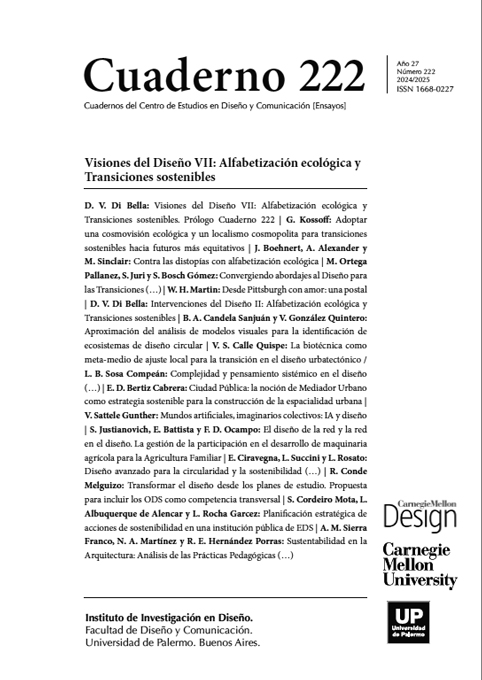Embracing an ecological worldview and cosmopolitan localism for sustainable transitions toward more equitable futures
Résumé
This paper introduces three key strategies for transitioning 21st-century societies towards more sustainable, equitable, and desirable long-term futures.
Références
Berman, M. (1981). The Reenchantment of the World. Ithaca, NY: Cornell University Press.
Boehnert, J. (2018). Design, Ecology and Politics: Towards the Ecocene. London, UK: Bloomsbury.
Bookchin, M (2015). The Next Revolution: Popular Assemblies and The Promise of Direct Democracy. London, UK, Verso.
Capra, F. and Luisi, P. L (2014). The Systems View of Life: A Unifying Vision. Cambridge, UK: Cambridge University Press.
Capra, F. (1984). The Turning Point: Science, Society and the Rising Culture.
Ceschin, F. and Gaziulusoy, I. (2020).
Clayton, P, Archie, K., Sachs, J and Steiner, E. (2021). Envisioning an Ecological Civilization. In The New Possible: Visions of Our World Beyond Crisis. Eugene, OR: Cascade Books.
De Young, R. and Princen, T. (2012). The Localization Reader: Adapting to the Coming Downshift. Boston, MA: MIT Press.
Delanty, G. (2009). The Cosmopolitan Imagination: The Renewal of Critical Social Theory. Cambridge, UK: Cambridge University Press.
Hopkins, R. (2011). The Transition Companion: Making Your Community More Resilient in Uncertain Times. White River Junction: Chelsea Green.
Irwin, T. (2011). Wicked Problems and the Relationship Triad. In Grow Small, Think Beautiful: Ideas for a Sustainable World from Schumacher College ed. Stephan Harding. Edinburgh, UK: Floris Books, pp. 232-257.
Irwin, T. (2019). The Emerging Transition Design Approach. Cuaderno Journal 73: Transition Design Monograph. University of Palermo, Argentina. pp. 51-66.
Irwin, T. and Kossoff, G. (2021a). About Transition Design, Transition Design Seminar (Website: https://transitiondesignseminarcmu.net/classes-2/introduction/ Accessed Feb. 2024).
Irwin, T. and Kossoff, G. (2021b). Wicked Problems: Anatomy and Dynamics, Transition Design Seminar Website: (https://transitiondesignseminarcmu.net/classes-2/mappingwicked-problems/ Accessed Feb. 2024).
Irwin, T. and Kossoff, G. (2021c). Designing Systems Interventions, Transition Design Seminar (Website: https://transitiondesignseminarcmu.net/assignments/#1515159007205-8d57b764-12c3 Accessed Feb. 2024).
Irwin, T. and Kossoff, G. (2024). Wicked Problem Resolution as a Strategy for Catalyzing Positive, Systems-Level Change. In Rachel Beth Egenhoefer (ed.) Routledge Handbook of Sustainable Design, 2nd edition. Abingdon, UK: Routledge.
Jacobs, J. (1992). The Death and Life of Great American Cities. New York, NY: Vintage.
Jepson, P. and Blythe, C. (2022). Rewilding: The Radical New Science of Ecological Recovery. Boston, MA: MIT Press.
Kossoff, G. (2019). Cosmopolitan Localism: The Planetary Networking of Everyday Life. Cuaderno Journal 73: Transition Design Monograph. University of Palermo, Argentina. pp. 51-66.
Kossoff, G. (2011). Holism and the Reconstitution of Everyday Life: A Framework for Transition to a Sustainable Society. In Grow Small, Think Beautiful: Ideas for a Sustainable World from Schumacher College ed. Stephan Harding. Edinburgh, UK: Floris Books, pp.122-142.
Kossoff, G. and Irwin T. (2022). Transition Design as a Strategy for Addressing Urban Wicked Problems. In Cities After Capitalism. Abingdon, UK: Routledge, pp.90-102.
Maffi, Luisa (ed.) (2001). On Biocultural Diversity: Linking Language, Knowledge and the Environment. Washington, D.C: Smithsonian.
Manzini, E. (2011). SLOC: The Emerging Scenario of Small, Open, Local, Connected. In Grow Small, Think Beautiful: Ideas for a Sustainable World from Schumacher College ed. Stephan Harding. Edinburgh, UK: Floris Books, pp. 216-231.
Merchant, Carolyn (1990). The Death of Nature: Women, Ecology and the Scientific Revolution. HarperOne. San Francisco, CA: HarperOne.
Mumford, L. (1974). The Pentagon of Power: The Myth of the Machine, Vol. 2. New York, NY. Harcourt, Brace, Jovanovich.
Nelson, K and Shilling, D. (ed.) (2018). Traditional Ecological Knowledge: Learning from Indigenous Practices for Environmental Sustainability. Cambridge, UK: Cambridge University Press.
Norberg Hodge, Helena. 2016. Localization: Essential Steps to an Economics of Happiness., Totnes, UK: Local Futures/ISEC.
Rittel, H. and Webber, M (1973). Dilemmas in a General Theory of Planning. Springer: Policy Sciences, Vol. 4, No. 2 (Jun. 1973), pp. 155-169.
Sachs, W. (1999). Planet Dialectics: Explorations in Environment and Development. London, UK: Zed Books, pp. 105-107.
Scott, J.C (2020). Seeing Like a State: How Certain Schemes to Improve the Human Condition Have Failed. New Haven, CT: Yale University Press.
Shiva, V. and Mies, M. (2014). Ecofeminism. London, UK: Zed Books.
Speth and Courier (2021). The New Systems Reader: Alternatives to a Failed Economy.
Tarnas, R. (1993). The Passion of the Western Mind: Understanding the Ideas that Have Shaped Our World View. New York, NY: Ballentine Books.
Watson, J. (2020). Lo-Tek: Design by Radical Indigenism. Cologne, Germany: Taschen.
Los autores/as que publiquen en esta revista ceden los derechos de autor y de publicación a "Cuadernos del Centro de Estudios de Diseño y Comunicación", Aceptando el registro de su trabajo bajo una licencia de atribución de Creative Commons, que permite a terceros utilizar lo publicado siempre que de el crédito pertinente a los autores y a esta revista.


